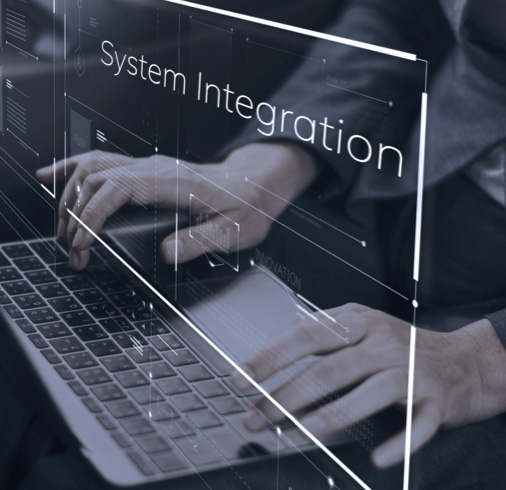
2003
Year of Establishment

100s
of Customers Worldwide

4.9/5
Customer Rating
How Fingent Helps
Digital transformation is imperative for businesses to stay competitive and relevant in this globalized world. With our technology capabilities and expertise, we help you seamlessly transform with quick and intelligent software integration. We ensure that you reshape your business processes with the right technology at the right time.
With our expertise and system integration services, you can be sure that implementation is accelerated, costs are reduced, and risks are minimized. Our system integration services can significantly reduce IT complexity while maximizing your ROI. We ensure that nothing can jeopardize your operations visibility, which may lead to suboptimal utilization of resources.

Our System Integration Services

Skillful Re-engineering

Custom System Design and Development

Seamless Integration for Data Utilization

Intelligent Integration Strategy

Skillful Re-engineering
It is vital to integrate software to achieve precise business objectives. At times some apps need to be retired, others replaced and a few others need to be integrated with newer solutions so they can deliver full value. We can take your desktop applications and re-engineer it for the web, allowing integration with a broader range of your business apps. We can bridge the gap between off-the-shelf software and the existing technology of your business.

Custom System Design and Development
Your organizations’ technology system is the backbone of your business needs. We provide custom system design and development services that address complex and multidimensional IT challenges. Our traditional and hybrid development approaches are unique.

Seamless Integration for Data Utilization
The complexity and size of stored data make it necessary to find improved ways to manage and utilize enormous amounts of data. We integrate multiple data sources with business software for easier access to valuable data. Such integration provides deeper insights into vital data, reduces or eliminates the need for double-entry and synchronizes data across business applications.

Intelligent Integration Strategy
Our intelligent integration strategy delivers a number of cost-effective benefits. We can update and integrate the software instead of spending money on replacing them. We will ensure that the necessary upgrades are made to make applications more flexible so that your business can keep up with changing regulatory requirements.
Why innovate your business with us
Consistent high-quality results with robust agile teams and dedicated QA practices
Highly cost-effective and best-of-breed solutions with no last-minute surprises
Transparent project management with maximum adherence to deadlines
Our Unique Approach & Process
By initiating your project with Fingent, you get a dedicated and skilled team backing you up round-the-clock. All our processes are customer-oriented, designed to reduce the cost of business operations, address IT resourcing challenges, and offer you a competitive edge. We start with a deep analysis of your requirements and continue our relationship with post-launch support and updates.
1
Research and Discovery
2
Validating and Shaping Idea
3
Design and Prototyping
4
Development
5
Testing and Quality Assurance
6
Maintenance and Support
Contact Us
Hundreds of leading businesses have derived strategic advantages from our transformative solutions.
The entire engagement was completely transparent and very systematic. It’s been an exceptional working experience.
Their team is completely committed to our success as a client, and they do that with their dynamic team.
They’ve also been great at meeting the needs of our timeframe versus theirs.
They go above and beyond what the typical developer interaction would be.
They were highly responsive to our needs.
We found their project management solid.
Reviews from engineers testify that their code was consistently solid and comprehensively documented.
I have been very pleased with Fingent Corporation’s user experience and design capabilities.
Fingent’s project team demonstrated passion and commitment throughout the dev cycle and it was very evident in their work.
They’re an honest company to deal with … they were always fair and reasonable.
FAQs
System integration is the process of creating a complex information system by integrating all the physical and virtual components of an organization to initiate an intelligent environment for better performance. It could be compared to arranging all the pieces of a puzzle. The many scattered pieces of various IT systems, services and software are integrated to work together to provide enhanced business growth.
System integration methods are divided into four major categories:
You will need system integration if you are:
- Merging different systems: If your organization wants to exhibit a specific functionality of a business need, it will necessitate the integration of various disparate system functionalities.
- Integrating legacy systems with new-age applications: System integration tools ensure a smooth and secure migration.
- Looking for multi-functionality.
Each organization requires a unique strategy. Try to avoid forcing integration recommendations to extract functions and capabilities that are missing. Ensure you plan appropriately with your vendor for perfect integration.
The term system integrator is used for a company that specializes in planning, coordinating, scheduling, implementing, testing, improving and maintaining integrated IT systems. The role of the system integrator also includes continuous management of solutions.
When the business grows rapidly, organizations struggle to manage the ever-expanding data. Unaligned systems and processes can be very time-consuming to manage. Effective integration of your systems ensures increased efficiency and effectiveness in your processes while reducing the disruption caused by having all your data in various places.